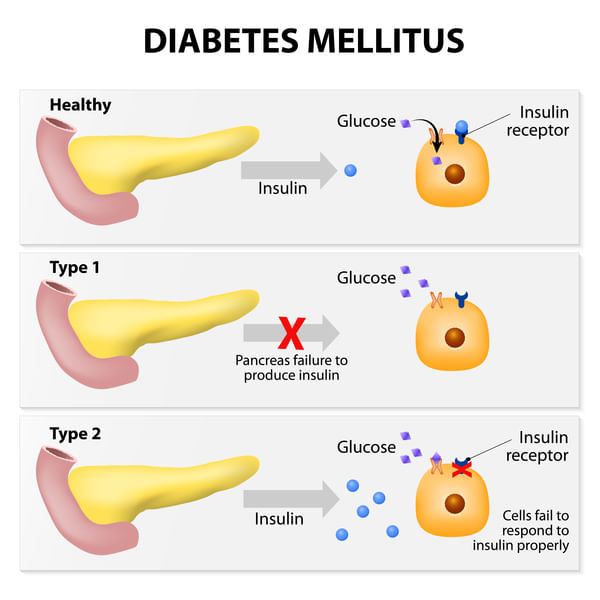Diabetes Mellitus!
Treatment of Diabetes Mellitus
Homeopathic Treatment of Diabetes Mellitus
Acupuncture Treatment of Diabetes Mellitus
Psychotherapy Treatment of Diabetes Mellitus
Conventional / Allopathic Treatment of Diabetes Mellitus
Surgical Treatment of Diabetes Mellitus
Dietary & Herbal Treatment of Diabetes Mellitus
Other Treatment of Diabetes Mellitus
What is Diabetes Mellitus
Symptoms of Diabetes Mellitus
Causes of Diabetes Mellitus
Risk factors of Diabetes Mellitus
Complications of Diabetes Mellitus
Lab Investigations and Diagnosis of Diabetes Mellitus
Precautions & Prevention of Diabetes Mellitus
Treatment of Diabetes Mellitus
Homeopathic Treatment of Diabetes Mellitus
Homeopathic treatment helps to improve the general health of a person and regulate the blood sugar levels. It can also help in prevention and treatment of various complications of diabetes as seen on kidney, eyes, sexual function, foot and others. Following are some medicines for diabetes.
Bryonia
Lactic acid
Nat Sulph
Syzygium
Phosphoric acid
Helonias D
Lycopodium
Terebin
Acupuncture Treatment of Diabetes Mellitus
Acupuncture is used to reduce blood sugar in persons with diabetes Acupuncturists have identified several points on the body that appear to be effective in lowering blood sugar. A dozen of these points are selected for treatment at one time.
Psychotherapy and Hypnotherapy Treatment of Diabetes Mellitus
Psychotherapy treatments in diabetes mellitus can lead to improvements in both depressive symptoms and glycaemic control. This treatment includes problem solving training and counseling or interpersonal therapy. Hypnotherapy can help in resolving underlying stress and other negative emotions.
Conventional / Allopathic Treatment of Diabetes Mellitus
Allopathic medicine such as Glyburide, Metformin, Acarbose, Troglitazone used to treat Type 2 diabetes. These drugs may improve blood-sugar control in people who take them. If these drugs does not work then insulin inject is used.
Surgical Treatment of Diabetes Mellitus
There is no surgical Treatment for Type II diabetes. Type I diabetes has only one surgical treatment known as pancreatic transplantation. A pancreas transplant is a surgical procedure to place a healthy pancreas from a donor into a person whose pancreas no longer functions properly.
Dietary & Herbal Treatment of Diabetes Mellitus
Avoid sugar in any form-rice, potato, banana, cereals & fruits
Avoid eating fatty foods
Eat Vegetables such as Bitter Gourd, cucumber, onion, garlic, string beans
Eat small meals in a whole day
Always eat a high-protein breakfast.
Other Treatment of Diabetes Mellitus
Yoga Asanas are very useful for Diabetes such as Bhujang Asana, Shalabh Asana, Dhanur Asana
Some exercise like cycling, swimming, jogging etc.
What is Diabetes Mellitus?
Diabetes mellitus is commonly known as diabetes. It is a situation in which the body does not produce enough insulin. This can form an increased concentration of glucose in the blood. There are three type of Diabetes: – Type 1, Type 2 and Gestational Diabetes.
Symptoms of Diabetes Mellitus
Frequent urination
Frequent skin infections
Extreme dryness or Thirst
Extreme hunger
Extraordinary weight gain or loss
Poor wound healing
Tingling in the leg
Increased fatigue
Irritability
Viral illness
Blurry vision
Causes of Diabetes Mellitus
Eating too much of carbohydrates, fats and protein
Virus infection
Obesity
Age
Emotional stress
Smoking
Inherited factor
Inactive lifestyle
Risk factors of Diabetes Mellitus
Blood Pressure
Hypertension
Abnormal cholesterol
Heaviness
Hypothyroidism
Chronic kidney disease
Complications of Diabetes Mellitus
Angina
Heart failure
Heart Attacks
Strokes
Leg cramps on walking
Poor Vision
Damage to nerves
Skin Breakdown
Diagnosis of Diabetes Mellitus
To check for symptoms of diabetes and high blood sugar, doctor perform the following steps:
Check your medical history
Physical examination
Tests that measure the glucose levels in your blood:
Fasting Plasma Glucose Test
Oral glucose tolerance test
Precautions & Prevention of Diabetes Mellitus
Avoid too much alcohol
Avoid smoking
Exercise regularly
Eat balance diet
Ignore inactive or sedentary lifestyle



+1.svg)
